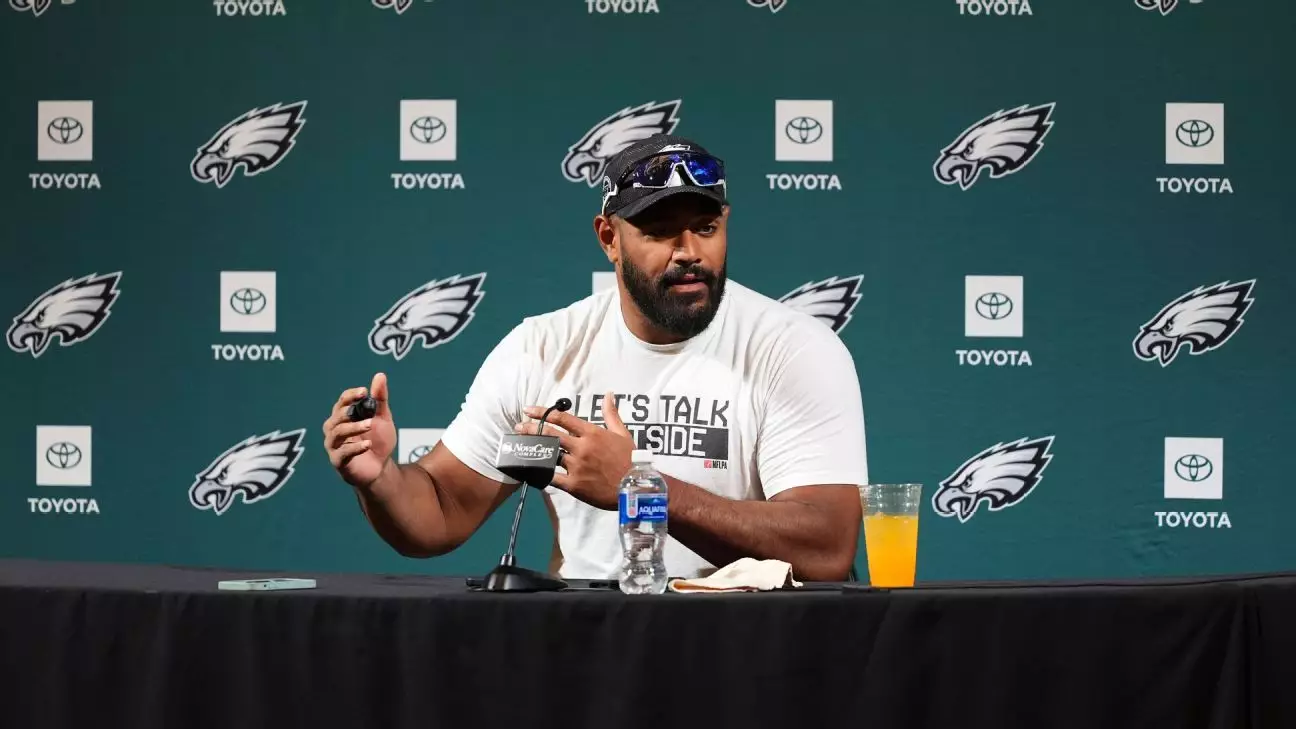In the fast-paced world of professional football, innovation often meets resistance, especially when success comes wrapped in controversy. The “tush push,” an offensive maneuver that has found a comfortable niche within the Philadelphia Eagles’ playbook, has recently sparked significant debate at the NFL level. As teams adapt their strategies to gain even the slightest edge, what might seem like a minor rule change could have far-reaching implications for the game. The fundamental question remains: why is such a seemingly innocuous play stirring such heated discussions among league owners and executives?
The tush push involves players providing a power boost to their quarterback during crucial short-yardage situations. This technique has become a hallmark for the Eagles, especially thanks to the exceptional performance of their offensive line and the remarkable strength of quarterback Jalen Hurts. A play that results in a near-certain first down invites scrutiny from rival teams, leading to calls for its prohibition. Yet, as any fan of the game knows, what makes football exciting is precisely this kind of competitive maneuvering.
A.J. Brown and Jordan Mailata: Players’ Perspectives
The discussions surrounding the tush push have drawn remarks from key Eagles players, including wide receiver A.J. Brown and left tackle Jordan Mailata. Their dismissive attitudes towards the potential ban reveal an interesting dynamic within the team. Brown downplayed the importance, suggesting that it’s merely a matter of gaining a single yard. His perspective shines a light on the mindset of players who, while respecting the rules and strategies of the game, remain focused on executing their duties without getting bogged down in speculation.
Mailata took a humorous route, marking his discontent with the play’s moniker with jokes about the “stupid name.” His light-hearted dissent showcases the camaraderie and unwavering focus of a team intent on championship aspirations, regardless of external controversies. “We’re focused on what’s next,” he asserted, encapsulating the steadfast mentality necessary for success in a sport where distraction can lead to downfall.
The Broader Implications of the Proposal
The quest to revise the rules surrounding the tush push is not merely about one play. It represents a broader agenda among NFL teams that feel threatened by the Eagles’ unique execution. The Green Bay Packers’ proposition aims to eliminate such assisted plays entirely, invoking a sense of fairness across the board. Yet, one must ponder the underlying motivations of teams advocating for this change. Is it a matter of creating a level playing field, or simply an admission that they lack the resources or talent to execute similar strategies?
Eagles CEO Jeffrey Lurie recognizes the tension when he describes the play as a “precision play.” He defends the practice as an integral part of the complex chess match that is football, arguing that banning plays based on their effectiveness undermines the sport’s essence. This sentiment should resonate with any football enthusiast who values tactical creativity and adaptability on the field.
The Tush Push Data: An Analysis
Although the tush push represents a mere fraction of the total plays executed in an NFL season—according to ESPN Research, it accounted for just 0.28% of plays last year—the significance of its execution cannot be understated. The Eagles and the Buffalo Bills formed a particularly successful partnership in employing this play, achieving a remarkable 87% success rate in advancing the ball. Their effectiveness starkly contrasts the overall league success rate of 71%, putting a microscope on a tactic that, for them, works exceptionally well.
This compelling statistical evidence frames a substantial argument against the ban. Should a team’s adaptability and execution become grounds for modifying game regulations? Critics may argue that the Eagles’ success is an outlier, but in competitive sports, such standout achievements should be celebrated rather than eliminated. Instead of stifling innovation, the league ought to encourage all teams to enhance their skill sets and strategies to compete at a higher level.
Looking Ahead: The Future of Football Strategy
As discussions about the tush push continue to swirl, the immediate future of the play remains uncertain. One thing is clear: football’s evolution is marked by both resistance and acceptance of change. Will the league embrace a more inclusive strategy that celebrates diversified tactics or restrict plays that separate the elite from the average?
Regardless of the outcome, the tussle over the tush push symbolizes a critical aspect of professional sports—constant evolution, adaptation, and, above all, the undying spirit of competition that continues to drive the game forward. The outcome of this debate may influence not only the Eagles but the fabric of football strategy as a whole for years to come.


Leave a Reply